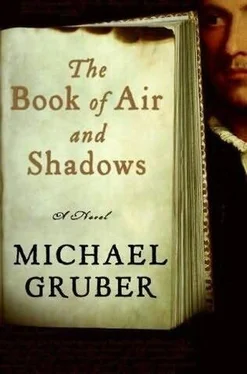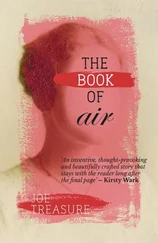He walked to the table where Haas was standing, gaping at him, a rabbit to the cobra, and picked up the packet of manuscript. He evened the edges and weighed them in his hand. “But you, Professor, you are not a whore. We have a business relationship, we are dealing with each other for all this time, I have confidence in you, man-to-man, how could you do this? I am very disappointed.”
“He’s lying,” said Haas, speaking rapidly, stuttering over the words. From where he stood, Crosetti could see the man’s knees actually trembling. “He made all that up to…confuse you. He’s very clever, he thinks he can get away with anything, the great Jake Mishkin, but he’s lying here, this is a genuine play, the greatest manuscript discovery of all time. I’m the fucking expert, Osip, for Christ’s sake, and anyway how could I have ‘conspired’ as you say with this woman, I never set eyes on her before in my life, and going to Pascoe and arranging all this…it’s ridiculous…you can’t believe. These pages in your hand, and the ciphers, and everything, they’re precious, precious, I never dreamed I would ever have my hands on something like this…”
Mishkin said, “He did know Carolyn Rolly. She was a student at Columbia. Bulstrode introduced them. Ask Crosetti.”
Crosetti cleared his throat, which felt like it was full of white library paste, and said, “Well, yeah. She definitely knew Bulstrode. And Bulstrode knew Haas.”
“You see, Professor?” said Shvanov. “It will not add up. And so I think he is right, I think this is all a cheat, and this paper is garbage.” With that, he took two quick steps and tossed the stack of pages into the fireplace.
Haas uttered a cry that seemed to come up from his descending colon, a brute scream of desperate loss, and immediately dashed across the room and threw himself into the heart of the fire. He grabbed handfuls of paper off the coals, pinching out any fire that had bit into them with his bare hands and tossing the pages back into the room, like a dog tossing earth out of a hole. Some of the pages, Crosetti saw, had caught in the updraft and had been plastered against the back of the deep fireplace, but Haas heaved his whole body across the blazing logs and pulled them free. As he did this he never stopped screaming, nor did he stop when he pulled himself out of the fire, ablaze all down the front of his clothes, his scarf a necklace of fire. He trotted in little circles slapping at the flames, his face a hideous black-red mask, his glasses warped and partially melted.
Mishkin now snatched up the flaming professor as if he had been a hollow man and made for the door, carrying him on his shoulder. The Deckhand tried to stop him and was stiff-armed out of the way, falling on a side table with a crash. Once outside, Mishkin dived into a hollow where the snow was relatively deep and used handfuls of it to douse the flames and after these had hissed out, used more snow to cool the red and tortured flesh showing through the charred clothing and on the face.
Crosetti observed this through the open door and watched as the Deckhand got up and tromped over to the kneeling Mishkin and kicked him hard in the ribs. He would have continued to kick had Shvanov not called him off.
“You know this gives me an idea,” said Shvanov. With a start, Crosetti realized that the gangster was addressing him. He immediately understood that the man was going to give him an explanation, because this is what movie gangsters always do for their victims, and he wondered if gangsters behaved so in earlier times. Probably yes, he thought, because you saw that in Shakespeare, the self-justifying villain, the delight in describing the prospect of death to the helpless victim. But did Shakespeare invent that, like screenwriters invented the quick-draw gunfight? Probably. He invented most of what passes for human behavior. Crosetti made himself concentrate on what Shvanov was saying.
“…so don’t you agree? Everyone will sacrifice for something, but not that kind of sacrifice, not the body, not even for money. For children maybe.” Here he looked coldly at the two Mishkin kids. “Or as we have just seen, for this manuscript. So, of course it is real.”
“You took a risk,” said Crosetti.
“Yes, but a man such as myself must take risks, it is entrepreneurial spirit. Now I have payoff.” He looked over to where his two men were gathering the sheets of scorched paper. “And I don’t think that some little burnt places will reduce the value too much if any. It gives a look of more authenticity, I believe, for so old a piece. But, as I say, this burning gives an idea. The professor Haas invites his good friend Mishkin to his cabin with his two children, and also his friend Crosetti with his girlfriend Carolyn, and they go out in the Haas speedboat on this beautiful lake, even though it is cold, because it is so beautiful in the snow and there is a tragic explosion, a gasoline leak, or whatever, and they are all burned and sunk in the water.”
“I don’t understand. I didn’t have anything to do with this scam and neither did Carolyn.”
“Yes, but you are witnesses. This is a Russian thing, I believe. Stalin taught this to us and we remember. In doubt, get rid of everyone except those who are…what is this word? Com…?”
“Complicit.”
“Exactly. Complicit. So now, you will all go into the boat.” He reached under his coat, brought out a pistol, and shouted something in Russian to his troops. Soon they were in a sad procession down to the lake’s edge. In the front, Mishkin carrying the moaning Haas in his arms, then the Mishkin children, then Crosetti and Carolyn. The Russians now had their weapons out, the Deckhand with his submachine gun, and the others with semiautomatic pistols. It was the Deckhand who escorted the prisoners into the boathouse and made them enter the speedboat. The Doughboy was filling a five-gallon jerrican with gas from the pump. Shvanov and the third murderer had gone to start up the cruiser.
Mishkin placed Haas in a corner of the rear seat and then helped the others into the craft. As Crosetti climbed in Mishkin said in a whisper, “Can you drive this thing?”
“Sure.”
“Then get behind the wheel.” Crosetti did and Mishkin sat beside him in the front.
The Doughboy finished filling the can and climbed into the boat with it, resting it on the rear seat. He said something to his companion, and they both laughed, and then said something to Imogen, grabbing her arm and his own crotch, and laughed again. The Deckhand said something back, threw off the stern line, and went forward to untie the line that held the prow of the speedboat to a cleat. From outside, they heard the roar of the Bayliner’s engine starting.
The Doughboy was still talking to Imogen, with his face close to hers. She screamed and tried to push him away. He grabbed her hair, forced her head down, and yanked open his fly, at which point Mishkin, to Crosetti’s immense surprise, reached under the seat cushion, pulled out a Luger, and shot the man in the face. Then, as the Doughboy collapsed and fell overboard, Mishkin turned and put five rounds into the kneeling, and even more surprised, Deckhand. “Crank it up!” he ordered Crosetti. “Go!”
Crosetti turned the ignition, the engine coughed, roared; he threw the gearshift forward and the speedboat shot out of the boathouse.
He felt an absurd giggle rise in his chest as they flew through the water. Of course there would be a chase at the end and here it was. It took a moment or two for Shvanov and his guy to understand what was happening, but when they saw that no black-coated figures were on guard in the speedboat, they took off in pursuit. Crosetti knew that there was no way that a Chris-Craft woodie with an ancient V-6 was going to outrun a modern Bayliner, with maybe three times the horsepower, but he jammed the throttle to the stop and awaited the denouement.
Читать дальше












